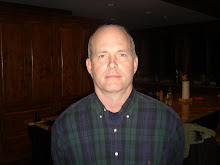For the first time in a couple of months, I don't feel like my future is an early death. I visited with my new endocrinologist at Emory University Medical Center today. Dr. Srivatsa is a 40-year old, female who is finally someone I can talk to who is on par with my knowledge of cancer, after my research. Before Dr. Srivatsa, I had talked to a cancer researcher, another MD and my surgeon--none who were experts in the Follicular/Hurthle cell cancer that I have. I am very confident that I have spent hundreds of hours reading about the cancer, and whenever I talk to a non-expert, I leave feeling like I am talking to a--well, a non-expert. It is funny--we all expect a "doctor" to know everything about anything--and that is not the case. I could rattle off research studies showing this mortality rate, or this percentage of efficacy with treatment X, or what each of the major medical centers in the country or world is doing, and 99.99% of medical professionals would not have a clue as to what I was talking about.
With Dr. Srivatsa, although she could not quote the dates of studies like I could or the exact date for FDA approval of Thyrogen (I aced her on these!), she was at least familiar with what is going on with Hurthle cell cancer. Now--I have someone I can converse with, and she offered to do that with whenever I wanted to talk.
She said that I went into the cancer treatment backward, which I now realized. I left my original endocrinologist, Dr. Wotten, because his recommended surgeon, could not see me until about right now to do the surgery. I was essentially turned over to a surgeon, with no overall doctor working with me to take the lead.
In any event, here are the conclusions for the day:
1. I am close to reaching the level of TSH to provide radioactive iodine. A blood test was taken and I will know for sure in a day or two. She guesses I am at a level "27" and need to increase it with a few more days to at least "30". The higher the number, the better.
2. The RAI will be late next week or the week following.
3. I will have a scan before and after, looking for cancer in my body.
4. I need to start on the low iodine diet and be on it for a week.
5. She agreed I was on too low a dose of Synthroid--about 40% low (112mcg versus 155). This means I have been hypothryroid since December 15, the day after my surgery.
The confidence she gave me was that it was unclear in her mind how much of my cancer was Hurthle cell and how much was follicular. Follicular is readily ablated by the RAI. If it is a majority of follicular, I would live a regular long term life, with precautions taken by having a scan every 6 or 12 months, and perhaps every 24 months after a few years.
She is also a proponent of using Thyrogen, instead of going off the Synthroid. However, because I am almost already there--with a low TSH level due to the elimination of the Synthroid, she agreed with me that I should continue on the plan with no Synthroid.
I am sorry if this is technical--it is more intended for future cancer victims who will be familiar with the terms.
Overall--a very good day.
skip to main |
skip to sidebar

My story of learning about my thyroid cancer, my prognosis, my treatment, my search for the best care, the fear of death, the effect on my family, and the changes in my perception and outlook on life.
About Me

- Steve Schultz
- I found out I had Hurthle Cell cancer on December 20, 2007, on my father's 70th birthday. This cancer can have a mortality rate in the 50-65% rate within 5 years, with a median life expectancy of 38 months. I am in the high risk group, but after almost three years, I am optimistic that I will live a long life.
Blunders in life
- If anyone asked "who would you like to meet in your life", my answer would be Neil Armstrong, the first man on the moon. Well, I did meet him and did not know it was him. He met me in Dayton Ohio, at the National Air Force Museum. I realized after-the-fact that this nice elderly man who answered a question I had, was Neil Armstrong. (I thought he looked familiar and then I saw his name on a list of guests attending the 100th anniversary of flight even starting in a few hours. I spent the rest of the day trying to find him to apologize for not recognizing him. My big blunder.
Things I Want to Do in My Life
- Travel to Alaska
- Outlive my dogs
- Walk Around the South Pole
- Be 65 and look like I am 35
- Retire
- See My Children have kids
- Take an around the World Cruise
Best Links on Hurtle Cell Cancer
- Baylor University Scientific Information on Hurthle Cell Cancer
- Cancer Staging Information
- Frequency of recurrence based on Tg levels
- Low Iodine Food List
- MD Anderson Prognostic Factors
- NY Cancer Center Radioactive Iodine Treatment Information
- Poor prognosis scientific article
- Positive Indication for RAI with Hurthle Cell
- Radioactive Iodine FAQ
- Scientific Article On Hurthle Cell Cancer
- Sloan Kettering Cancer Center--60 Year Prognosis Study
- Thyrogen Information
- Thyroid Cancer Survivor's Association--Great Site